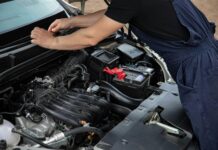If you’ve been involved in a car accident, it can be difficult to get back on your feet and start driving again. But taking the time to practice self-care is essential for proper recovery, both physically and mentally. In this blog post, we will break down 4 ways that you can help yourself heal and become ready to safely take the wheel again. We hope that this article provides some useful tips so you can feel more confident getting behind the wheel once more!
Take Time to Heal Physically
Healing physically is just as important as healing mentally. It’s necessary for restoring the body to its former strength and vitality. Rest is a vital component during the healing process since it allows the body to recover from intense workouts and injuries. Exercise also plays a significant role in physical healing by promoting blood flow and muscle growth. However, it’s vital to take things slow and not rush the recovery process. Even if you don’t experience any major injuries from the crash itself, it’s a good idea to go to a doctor who specializes in auto accident injury treatment. They’ll be able to diagnose any potential issues you might eventually have in addition to any wounds you may have experienced the day of. By taking the time to prioritize physical healing, the body can quickly bounce back and come back stronger than before.
Allow for Your Emotional Recovery
When we go through tough times, it’s natural to feel lost and overwhelmed. Dealing with negative emotions can be exhausting and at times, it may seem like there’s no way out. However, it’s important to remember that you are not alone. There’s no ‘right’ difficulty you need to be facing to get professional help. Seeking support from a counselor or therapist or reaching out to a trusted friend can make a world of difference. Talking about your feelings and working through them with someone who understands can help you gain clarity and move towards healing. Give yourself the time and care you need before making the step to start driving again.
Re-Learn How To Drive
Driving is a skill that many of us have taken for granted, but it’s never too late to brush up on our abilities behind the wheel. Defensive driving courses are designed to teach drivers how to anticipate and react to potential hazards on the road, enhancing their safety and that of others. Moreover, familiarizing yourself with the rules of the road can lead to smoother, more confident driving experiences. Whether you’re looking to refresh your driving knowledge or want to improve your skills, taking a defensive driving course is an excellent way to do so. Who knows – you might even learn something new that could save your life.
Prepare Yourself For Your First Major Drive
Getting back behind the wheel can be a very difficult experience when trying to heal from the trauma of a car accident. While baby steps like driving in a parking lot and short neighborhood drives are recommended, eventually, you’ll need to drive a longer distance and on riskier roads. Make sure that you have someone with you when you go, and be sure to practice methods of calming yourself in case of panic or anxiety attacks. Take as long as you need to build up to it, but never give up on yourself; while it’s tempting to convince yourself that you don’t need to drive, it’s one of the most important skills to have to be self-sufficient. And when you overcome the hurdle of your first major drive after the accident, you’ll find yourself well on the road to healing and independence once again.
Solutions to Use Until You’re Ready to Drive Again
As you continue to make progress on healing and recovery, it can be convenient to use other options of transportation until you feel ready to drive yourself. Getting a well-tuned bike can get you around town for day to day travels, and public transport like busses and shuttles can help you get farther out. You might be able to solve the problem of getting to work via carpooling or asking a friend for a ride. However you need, look for travel options that will fit your situation until you’re comfortable driving again.
After an accident, it is essential to practice self-care and actively work on your mental health in order to heal properly. Having the courage to take a step back after a traumatic experience and make your well-being a priority is invaluable. You are entitled to feel scared before you get behind the wheel again but don’t let that fear control you forever. Taking the time to restore yourself both physically and emotionally will help you gain confidence in driving again while remaining patient and kind to yourself. With careful planning, guidance, and persistence, you can learn how to drive anew while weaving self-care practices into your daily life in order to create a balanced routine that creates harmony within yourself.















